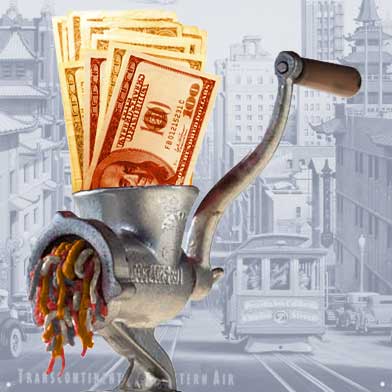 What’s going on the world of transit today? Well, everyone’s got an opinion–cab drivers, Muni riders, drinkers, and a Weiner–and they’re all giving them to San Francisco’s Municipal Transportation Agency with varying degrees of anger. If you have an opinion on the MTA yourself, leave it in the comments.
What’s going on the world of transit today? Well, everyone’s got an opinion–cab drivers, Muni riders, drinkers, and a Weiner–and they’re all giving them to San Francisco’s Municipal Transportation Agency with varying degrees of anger. If you have an opinion on the MTA yourself, leave it in the comments.
Crabby Cabbies
It didn’t matter that taxis weren’t on the agenda for Tuesday’s MTA board of directors meeting because, after 60 irate cab drivers showed up to flood the public comment portion of the evening with a litany of complaints, it was clear that taxis were going to be the topic of the day.
The drivers were angry about two changes the MTA is looking to implement that will change the way the city’s always-scare-when-you’re-trying-to-get-home-from-North-Beach-at-two-in-the-morning fleet of cabs operates.
The first change is a 5% fee on credit card transactions that individual cab drivers will have to pay starting April 15th. The use of credit cards in cabs has seen a threefold increase over the past five years and now accounts for nearly one third of all taxi payment transactions. Credit card companies charge merchants around 5% for every transaction and, up until now, companies like Yellow Cab were required to just eat it. The companies recently received a waiver from the MTA allowing them to pass the expense off onto their drivers. Driving a cab isn’t exactly a high margin business, so taking 5% of the top of every third fare would make a noticeable difference in the average cabbie’s bottom line.
Their other issue was a new tracking system put in place by the cab companies to record all transactions made by their drivers. A similar system in New York City found that 36,000 drivers overcharged passengers in 2010 to the tune of $8.3 million. Drivers in San Francisco worry about privacy concerns and that third-parties could access the personal information stored in the system.
The MTA board didn’t make any immediate changes but promised to address the issues sometime in the future.
Muni Might Begin Implementation of Years-Old Service Improvement Plan
A few years back, Muni got tired of having random people on the street yell “helpful” suggestions about where they can stick various things and realized it might be more productive if they heard those ideas in a more orderly fashion. That’s why Muni launched the Transit Effectiveness Project in 2006–a system-wide survey combining empirical research with extensive community meetings to determine how to turn the frowns on the 57% of Muni riders who think the service is on the wrong track upside down. Recommendations from the project included everything from long-term capital improvements to changes in bus routes.
While the plan was adopted in 2008, the majority of its prescriptions weren’t implemented due to Muni’s extreme brokeatude. In fact, they primarily used the plan to determine the best palaces for service cutbacks.
Now Muni is finally taking the TEP out of the closet and starting to actually do something with it. Hooray?
As with virtually everything in San Francisco, implementation will start with a lengthy and complicated environmental review but ends with route changes and other improvements that will make service more efficient and effective. The changes are set to go into full effect by 2016–so mark your calendars.
However, Muni has only set aside $17 million for the plan, which may not be enough to fully execute everything they want to. Also, one of the ways they’re planning on streamlining service is by consolidating bus stops. Every bus stop has its own constituency and any talk of eliminating stops gives San Franciscans an opportunity to do the thing they’re best at–complaining about changes in city government policy.
Weiner and Muni Management Differ On Accounts of Malfunctioning Door
As you know, a Muni train recently drove at full speed with its door hanging wide open between Van Ness and Church stations. Video from the event shows the riders acting more or less passé about the whole ordeal and initially it seemed like that was due to the calming presence of Supervisor Scott Weiner on the train (or being too wrapped up in their iPods). Weiner, who texted Muni operations chief John Haley and embattled Muni boss Nat Ford about the mishap, said that “It was one of those Twilight Zone situations.” Weiner’s absolutely right on that one because, much like every episode of the Twilight Zone ever, the real monster was man–Muni attributed the open door to driver error.
Interestingly, some controversy is brewing around Weiner’s statements. Weiner claims that the real reason for everyone on the train’s placid demeanors was that the driver notified passengers that the door was open and they should just stand back from it and not panic. Haley, on the other hand, claims that the driver wasn’t aware of the open door during the ride.
Fight! Fight! Fight!
No matter who is correct here, Muni safety regulations dictate that passengers should just pull the emergency brake if they’re on a train running with its door open.
Screw it, just have a drink
A Streetcar Called Taraval brings us their Muni drinking game, which would have most of us on the floor in no time. Finish your beer, you are told is “your driver gets out of the vehicle to run into a corner store (add a shot if he comes back with lotto tickets).” Wooo! Muni Diaries suggests some additions, one of which involves “bulbous balls.” You have been warned.
Want more news, sent to your inbox every day? Then how about subscribing to our email newsletter? Here’s why we think you should. Come on, give it a try.









